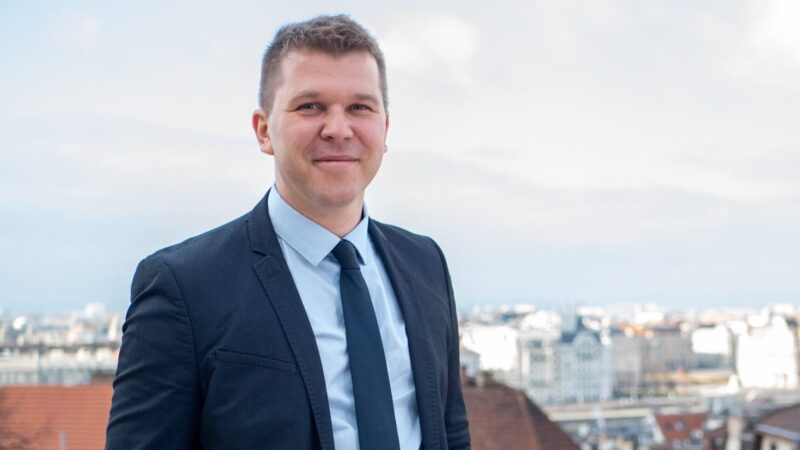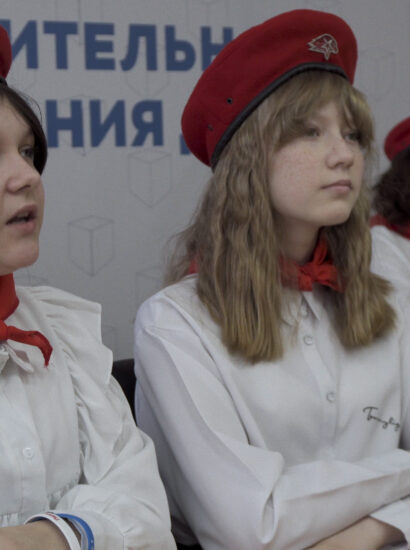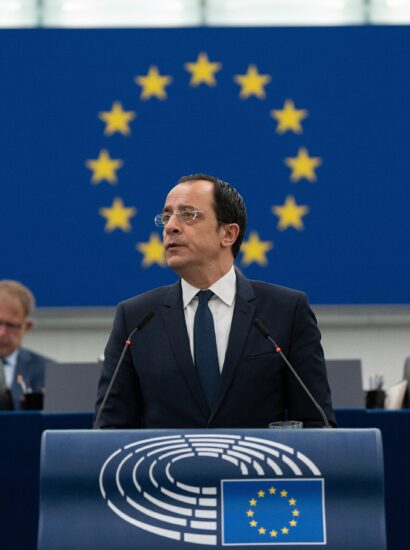The Russian rouble dropped to 110 against the US dollar on November 27, its lowest level since the start of the war in Ukraine. Many are sad that this is part of a developing crisis affecting the country’s economy. However, the Russian economy has not collapsed since. Yet, as a result of the Western sanctions, it has suffered serious damage.
To understand these contradictory processes and to get a glimpse into the mindset of the Kremlin and the Russian people, we sit down with Anton Bendarjevskiy, policy analyst and journalist. Anton was born in Minsk, Belarus, but he moved to Hungary at an early age. He studied media and communication, and history at the University of Pécs.
He also studied political science on a one-semester scholarship at the University of Leicester in the United Kingdom. Anton was director of the geopolitical foundation of the Hungarian National Bank, then served as a research director at the Danube Institute between 2021-2022.
Currently, he is a Director of the Oeconomus Economic Research Foundation. He is a regular columnist at the major Hungarian media outlets, providing expertise on the security policy of post-Soviet states.
In just a matter of weeks, the rouble, Russia’s currency, experienced a significant collapse, and recently, Gazprombank—the final major entity associated with Western payment systems—faced sanctions. Conversely, Russia generates over €600 million daily and more than €220 billion annually from its fossil fuel exports. Make it clear: are the sanctions hurting Moscow or not?
It depends on how you ask the question: what was the purpose of the sanctions? If the aim was to cripple the Russian economy, we can conclude that this aim was not achieved. We are now on the 15th bundle of EU sanctions, in addition there are sanctions on other countries, practically all areas of life are targeted by these sanctions.
Russia is the most sanctioned country in the world, but they have managed to ensure that the Russian economy has not collapsed and has felt less of the impact of the sanctions.
There are three main reasons for this. The first is that Russia has consciously prepared for this situation, so it was not completely unexpected that sanctions were imposed on them. Since the 2010s, they have been trying to condition different areas of the Russian economy to make them independent . A typical example is Russia’s creation of its own bank card system called MIR. They also have developed their own financial system capable of replacing Swift. In addition, reserves were built up, perhaps most importantly, so that part of the oil revenues were not reinvested in the Russian economy from the 2000s onwards. This was, by the way, not necessarily a good move from an economic point of view. There was a lot of criticism of the Russian economy because 15-20 excellent years had passed when the Russians had profited a lot from exporting raw materials. Still, they had not modernised the Russian economy, they had not made an economic transition like the Gulf states, for example.
Furthermore, they have been compelled to utilize their National Wealth Fund Assets, established from the earnings generated by oil revenues. Vladimir Putin sacrificed this strict reserve policy on the altar of war. Is that right?
They keep spending it. It is a fund of over 600 billion dollars. About half of it has been frozen under Western sanctions, but the other half is available. Coming back to the reason why sanctions are ineffective. Another reason is the way the international economy works. In the current globalised economic system, you simply cannot isolate a country completely. There will always be countries that do not join the sanctions because they can profit a lot by trading with the sanctioned state.
These are the third-country intermediaries?
Yes, the Turkish, Kazakh, Chinese, etc. companies are, on the one hand, taking the place of the Western companies leaving Russia. On the other hand, they profit through intermediation, getting cheap access to Russian raw materials. And
the third component – and Russia’s critics also acknowledge this – is that the Russian leadership relies on technocrats in the economic and financial sphere. So, they are not political appointees, and they have been able to manage this crisis for the Russian economy in a very professional way.
One such is the governor of the National Bank, Elvira Nabiulina. There is also Maxim Oreshkin, former Minister of Economy (now Chief Economic Adviser to Vladimir Putin), and Anton Siluanov, current Minister of Finance. Thanks to their competence, Russia has survived the sanctions relatively well so far. However, it should also be noted that the sanctions do cause serious damage, but not the kind that would lead to the collapse of the Russian economy.
The Cost-of-Living Crisis
Since the war began, living costs in Russia have increased by about 22 percent, with an additional inflation rate of 9.5 percent. Could this decline in living standards spark protests against the regime?
The question is to what extent people associate these processes with sanctions and war. This is something that is perhaps not yet going through, but there is such a framing of Russian propaganda that they are not fighting the Ukrainians here in Ukraine but NATO. And that the West, as it did with the Soviet Union, is now seeking to destroy Russia.
Moving on to Russian domestic politics, including the views of ordinary people on the war. For you, who also have personal contacts with Russians, how do they describe their feelings regarding the conflict?
What we were talking about earlier, for example, the collapse of the Russian currency, has only just hit the news, but people I know who live there have been telling me for months that it was practically impossible to get currency at official prices.
This kind of mentality has its roots in the 1990s when the national currency was constantly devalued to such an extent that people have since been conditioned to prefer to change to a foreign currency as soon as they get their salary because that is the only certainty that is in foreign currency.
Now, they can only do that at a great loss.
How has public opinion about the war itself changed in the last 1000 days? According to several sources, ordinary people simply want to return to their pre-war, peaceful lives, indifferent to such things as great power status.
The Levada Centre has accurate measurements of this. Their last poll relates to people’s opinion of the war, or as in Russia, they called it the ‘special operation,’ and it’s end. While in 2022, after the fighting started when the Russians asked if they supported the special military operation, the majority, roughly 60 percent, said that the operation should continue until Putin reached the goals he had set, and the percentage of those in favour of peace was something like 38-40. We are now at the point where the majority, 55 percent, say that peace should be made even if Russia does not achieve its military objectives and only 36 percent say that it should continue. This shows me that the Russian population is also getting tired of fighting even though there are only moderate military activities on Russian territory.
What about the Russian opposition? Does it even exist in such circumstances?
Among the anti-regime actors in the country, the Russian Anti-Corruption Foundation (ACF), founded by Alexei Navalny, who died this year, is still active today, with its members continuing to produce video investigative reports. In exile, the Khodorkovsky Group and the Free Russia Foundation are still active.
It is almost impossible to carry out opposition activities under the conditions that exist in Russia, i.e. censorship and the risk of imprisonment. Anyone who has carried out any political activity critical of the government has already been classified, first as a foreign agent, then as an extremist, and it is even a crime to cite them in Russia. So they had little choice but to keep quiet or emigrate from Russia to protect their own and their families’ lives.
Transition of Power Scenarios
Putin was elected president for a fifth time in March, with an overwhelming majority, according to Kremlin figures. If he completes his current term, he will rule for at least 30 years, just like Stalin. To what extent can we estimate Putin’s support?
In this type of system, it is impossible to measure it realistically: the president’s confidence indexes are consistently around 50 percent, although they are on a downward trend. And his approval rating is above 70 percent. But that doesn’t mean anything because, for example, the support of the communist Romanian dictator Ceaușescu was sky-high in the pre-revolutionary period, and then it collapsed in a few days.
As the historian Timothy Snyder says: “The dictatorships often seem stable until the moment when suddenly they are not. Often, a failed war adventure, combined with a surprising development in domestic politics, triggers the change that can topple a regime.”
As an analyst, I would prefer to say that although Russian history shows that a collapse could come at any time, the chances of that happening are currently unlikely. A more likely scenario is that Putin and his circles’ biological clock are ticking (the president and his confidants are both over 70). So, a new generation of politicians will have to come in and bring change. That is a safe bet.
Can we rule out the possibility of a coup?
I would prefer to say that a Gorbakhovian power reshuffle could follow. A generation will come to power that will be interested in bringing Russia out of its international isolation. Just as Gorbachev did not want to dismantle the system, this new generation does not want to dismantle Putinism but would rather reform it. It is important to notice that this generation was socialized after the Soviet era. Currently, the people around Putin, such as Sergei Soygu and Nikolai Patrushev, who think similarly to him, would take Putin’s position if anything happened to him. They need to disappear from the scene, too.
Misinformation Campaigns as their Best
Let’s talk about the Russian disinformation warfare against the West. What is Moscow’s intent apart from discrediting Ukraine?
It’s very instructive – there have been several analyses of this –that there is no uniform Russian propaganda or disinformation. Instead, different strategies are being pursued everywhere, based on Russia’s experiences in those countries. So, the strategy they follow in Hungary is different, and the way they communicate and the channels and tools they use are different. In Hungary, for example, Telegram or X, formerly Twitter, is not so popular, so they don’t have much presence on these channels, but on Facebook, there are a number of groups that have been set up that are openly following this pro-Russia theme.
Can you name these groups?
I don’t want to name them. The Facebook group is not so much about that, anyway. There are obviously other forums. It seems that they adapt to the way it is used in the country and that the narratives are used accordingly in the topics. In most Central and Eastern European countries, there is no overt reference to the Soviet era or any nostalgia for it. Whereas, in Belarus, the communication of pro-Russian groups goes back to exactly that and emphasises common roots. In Hungary, on the other hand, there is none of this, and instead, the Hungarian-Ukrainian differences are magnified. Obviously, some of all propaganda is real, but how it is framed is another matter. It’s very interesting how it works in France, where they emphasise how good and pragmatic relations between the French and Russians have been throughout history. So, first, they identify the common points and problems that are of concern to the society in question, and then they try to exploit these common points and magnify the problems, and distort them if necessary. What we are dealing with here is an entirely well-designed information warfare.
We have also published a compilation on the presence of Russian and Chinese services in Western European parties, mainly on the far right side of the political arena. What can be said about the Russian infiltration into different groups and political formations in the West?
I think it is worth looking at the extent to which these parties represent Russian interests. Russians are identifying political forces that are, on the one hand, far from the mainstream and, on the other hand, can best represent RRussia’sinterest within the country. Irrespective of relations with Russia, so there is no need to be Russian or Putin supporters here.
It is enough if their policies contradict the current political elites’ pro-European, pro-Western narrative in some respects, then they can be supported.
Of course, there are countries where openly pro-Russian parties are supported by Moscow. But in this case, I ddon’tname anyone, either.
Most recently, in the Romanian presidential election, a surprise candidate, the non-party Calin Georgescu, probably backed by Moscow (in official terms: ‘’aforeign state actor’’, won the first round, which has since been annulled.
Given that there is evidence of Russian interference in the Moldovan elections, it is not inconceivable that the same was attempted in Romania. If we were now sitting in the Kremlin and the strategy was how to make support for Ukraine impossible – Kyiv gets its arms and other supplies directly through Romania and Poland – then we would have to find ways to support political parties in those countries that oppose support for Ukraine or have an anti-American narrative.
Russian Spies Everywhere
In addition to disinformation attacks, sabotage actions in Europe have recently intensified as well.
In this so-called hybrid warfare, the Russians have a great deal of experience and are presumably constantly carrying out such actions. They cannot afford a direct confrontation with NATO, nor does NATO want a direct confrontation with Moscow. This was the case most recently with the severing of a communications cable under the Baltic Sea, supposedly by a Chinese ship, but it is impossible to say for sure whether this was an accident or not.
The background to this is that the Russians were prepared, while the Western counterintelligence was completely asleep.
Russia was prepared for this; it is not that they gave up all such activities after the collapse of the Soviet Union. Spies and spy cells are not organised overnight, but these people spend a decade or two in the target country or are even born there. It is, therefore, not difficult to organise such sabotage operations and finance local pro-Russian forces because there are well-established contacts and infiltrated cells.
To conclude, llet’sevaluate Donald TTrump’splan to end (?) the Russia-Ukraine war. Many are presenting it as a double blackmail plan that could bring both the Russians and the Ukrainians to the negotiating table. Do you think this type of manifestation of transactional politics can succeed?
Obviously, there is an element of blackmail, but the truth is that it also helps the Ukrainians to some extent. It is difficult for Zelensky, as the responsible leader of a state, to say that I will sit down and negotiate with someone who has killed hundreds of thousands of my fellow citizens, destroyed whole cities, and occupied 18-19 percent of our territory. So, the Trump peace plan also protects the Ukrainians in this respect because it takes the responsibility off their shoulders. If this kind of demand comes from outside, it is easier for the Ukrainian leadership to agree to it because they can say, well, this is what I wanted, but unfortunately, our allies expect something else from us. So, I think there is a rationale for this plan.
It is probably easier now to convince people to accept a compromise peace; a recent survey has shown that the majority of Ukrainian society is already tired of such a peace and would accept it.
I think it is only natural; the war has been going on for three years now, and it would be a miracle if they had not grown tired because the terror that the Russians use on a daily basis has an effect. I am confident that the plan that Kellog may represent is that this peace is fundamentally based on strength and does not allow UUkraine’sallies, especially the United States, to show weakness.
Moscow can be emboldened to push even harder.
Yes, this is very important. I think Donald Trump is assuming that the way in which the United States withdrew from Afghanistan under Joe Biden played a big role in the behaviour of the Russians or the Iranians.
What Putin and the Iranian leadership took from that is that Washington showed weakness in the way it abandoned its ally. It follows from this logic that such a situation must not be created now.
So, Ukraine must not be abandoned. The fact that Ukraine is now being forced to the negotiating table does not mean that Kyiv is being deprived of the possibility of good peace. I think it will be much more difficult to get Putin to sit down at the negotiating table.







